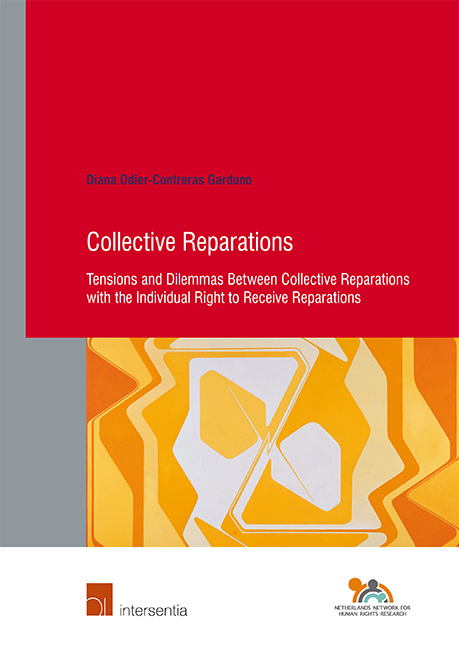 Collective Reparations
Collective Reparations Book contents
- Frontmatter
- Acknowledgments
- Table of Contents
- Abbreviations
- Chapter I Introduction
- Chapter II Developments Concerning the Right to Reparation
- Chapter III Collective Reparations at the Inter-American Court of Human Rights
- Chapter IV Collective Reparations in International Criminal Law
- Chapter V Collective Reparations & Non-Judicial Bodies
- Chapter VI Conclusions
- Samenvatting
- Resumen
- Résumé
- Bibliography
- Table of Instruments
- Table of Cases, Decisions and Filings
- Curriculum Vitae
- Human Rights Research Series
Chapter I - Introduction
Published online by Cambridge University Press: 31 January 2019
- Frontmatter
- Acknowledgments
- Table of Contents
- Abbreviations
- Chapter I Introduction
- Chapter II Developments Concerning the Right to Reparation
- Chapter III Collective Reparations at the Inter-American Court of Human Rights
- Chapter IV Collective Reparations in International Criminal Law
- Chapter V Collective Reparations & Non-Judicial Bodies
- Chapter VI Conclusions
- Samenvatting
- Resumen
- Résumé
- Bibliography
- Table of Instruments
- Table of Cases, Decisions and Filings
- Curriculum Vitae
- Human Rights Research Series
Summary
So many roads, so much at stake So many dead ends, I'm at the edge of the lake Sometimes I wonder what it's gonna take To find [and repair] dignity1
Introduction
It is undeniable that ‘human beings are capable of treating other human beings with unspeakable cruelty’. History details the numerous ways in which humans engage in acts of gross violations of the rights of individuals or collectives on the basis of their political affiliation, ethnicity, race, religion or beliefs, amongst others. These actions convey a message of inferiority to targeted groups, because these groups do not enjoy the same rights and protection that are afforded to other groups in a society. Gross violations of human rights are commonly committed within the context of authoritarian regimes or civil conflicts. They form part of both our past and our present. And to a great extent, they continue to occur with impunity. Situations of mass violence in countries such as Rwanda, the former Yugoslavia, Guatemala, Sudan, Darfur, and more recently, Syria, remind us that mass killings, and extreme violence in general, have not decreased since the ‘never again’ promise pledged at the end of the Second World War. When confronted with the reality of ‘again and again’, such a promise is reduced to wishful thinking.
The persistence and recurrence of gross violations of human rights have resulted in an enormous number of victims across the world. Those who have not been killed have been deeply affected by the killing of their loved ones, and grave infringements of their rights through abuses such as prolonged detention and torture, mutilation, rape, or the destruction of their properties and their means of livelihood. The physical, psychological, and economic consequences at both the individual and societal levels are to some extent immeasurable6 and irreparable. Gross violations of human rights deeply affect individuals and they damage the social fabric of a given society8 as they result in multiple and severe harm. Consequently, such gross violations destroy individual lives and breach the trust fostered between people and invested in political institutions.
Despite the consequences of these infringements, for many years the plight of victims of gross violations of human rights was ignored not only at the national level, but also at the international level. Moreover, history demonstrates that victims consistently face major challenges in their pursuit of justice.
- Type
- Chapter
- Information
- Collective ReparationsTensions and Dilemmas Between Collective Reparations and the Individual Right to Receive Reparations, pp. 1 - 32Publisher: IntersentiaPrint publication year: 2018


